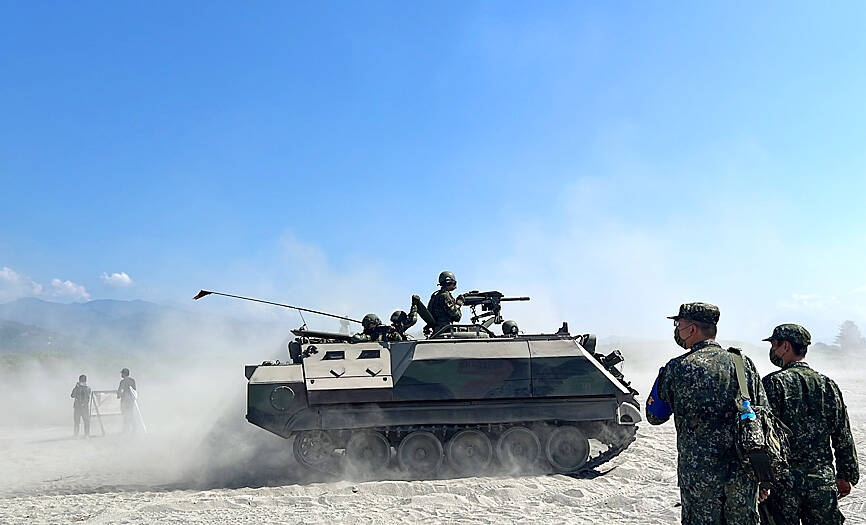Taiwan’s annual war games this year would simulate responses to a potential Chinese invasion based on the latest threats posed by the Chinese People’s Liberation Army (PLA), the Ministry of National Defense said yesterday.
As in previous years, this year’s Han Kuang drills would be held in two stages, the ministry said.
The tabletop war games phase would be held from May 15 to 19 and the live-fire exercise component is scheduled for July 24 to 28, said Major General Lin Wen-huang (林文皇), who is in charge of planning at the ministry.

Photo: CNA
The computerized war games would be conducted using the US-built Joint Theater Level Simulation platform, which simulates joint, combined and civil-military operations at an operational level, Lin said.
The simulations would be held around the clock for five days in a row to test the ability of military personnel to coordinate and launch a response to a hypothetical Chinese invasion, he said.
The main emphasis of the live-fire drills would be on testing the military’s ability to preserve its forces in the event of a full-scale invasion and to conduct “maritime interceptions” to counter a simulated attempt by the PLA to blockade Taiwan.
That would include using civilian airports and dispersing air assets, as well as disguising forces on the ground, and integrating sea, air and land forces to attack enemy forces and amphibious assault ships, Lin said.
He did not directly address a question about whether the Han Kuang exercises would simulate a response to China’s newest aircraft carrier, the Shandong, which recently this month engaged in its first-ever exercises in the western Pacific in waters not far from Taiwan.
Taiwan’s drills would simulate all kinds of recent PLA maneuvers and deployments that pose a threat to the country, he said.
He also did not directly comment on whether a military aircraft emergency landing and takeoff drill would be staged for the first time at a civilian airport in eastern Taiwan in July during the live-fire portion of the exercises, as the Central News Agency (CNA) reported last month.
The general said that civilian airports would be an important asset for the military to increase its flexibility and make sure its air assets could survive longer, which is why the ministry would simulate the scenario.
An unnamed source on March 28 told CNA that the drill to be staged at Taitung Fengnian Airport would simulate a scenario in which Taiwan’s military airports and airstrips are severely damaged by enemy fire, requiring fighter jets to land at civilian facilities or sections of freeway designated as makeshift runways.
If it went ahead, it would be the first time that such a drill is staged at the airport since it opened in 1981.
The Han Kuang exercises have been held annually since 1984 to test the combat readiness of Taiwan’s military branches.

The CIA has a message for Chinese government officials worried about their place in Chinese President Xi Jinping’s (習近平) government: Come work with us. The agency released two Mandarin-language videos on social media on Thursday inviting disgruntled officials to contact the CIA. The recruitment videos posted on YouTube and X racked up more than 5 million views combined in their first day. The outreach comes as CIA Director John Ratcliffe has vowed to boost the agency’s use of intelligence from human sources and its focus on China, which has recently targeted US officials with its own espionage operations. The videos are “aimed at

STEADFAST FRIEND: The bills encourage increased Taiwan-US engagement and address China’s distortion of UN Resolution 2758 to isolate Taiwan internationally The Presidential Office yesterday thanked the US House of Representatives for unanimously passing two Taiwan-related bills highlighting its solid support for Taiwan’s democracy and global participation, and for deepening bilateral relations. One of the bills, the Taiwan Assurance Implementation Act, requires the US Department of State to periodically review its guidelines for engagement with Taiwan, and report to the US Congress on the guidelines and plans to lift self-imposed limitations on US-Taiwan engagement. The other bill is the Taiwan International Solidarity Act, which clarifies that UN Resolution 2758 does not address the issue of the representation of Taiwan or its people in

US Indo-Pacific Commander Admiral Samuel Paparo on Friday expressed concern over the rate at which China is diversifying its military exercises, the Financial Times (FT) reported on Saturday. “The rates of change on the depth and breadth of their exercises is the one non-linear effect that I’ve seen in the last year that wakes me up at night or keeps me up at night,” Paparo was quoted by FT as saying while attending the annual Sedona Forum at the McCain Institute in Arizona. Paparo also expressed concern over the speed with which China was expanding its military. While the US

SHIFT: Taiwan’s better-than-expected first-quarter GDP and signs of weakness in the US have driven global capital back to emerging markets, the central bank head said The central bank yesterday blamed market speculation for the steep rise in the local currency, and urged exporters and financial institutions to stay calm and stop panic sell-offs to avoid hurting their own profitability. The nation’s top monetary policymaker said that it would step in, if necessary, to maintain order and stability in the foreign exchange market. The remarks came as the NT dollar yesterday closed up NT$0.919 to NT$30.145 against the US dollar in Taipei trading, after rising as high as NT$29.59 in intraday trading. The local currency has surged 5.85 percent against the greenback over the past two sessions, central